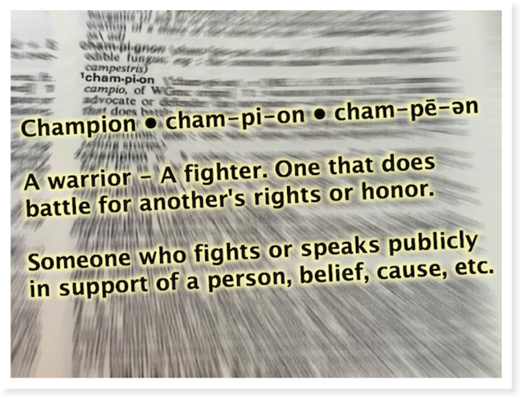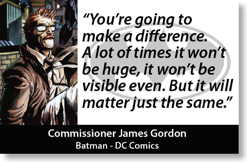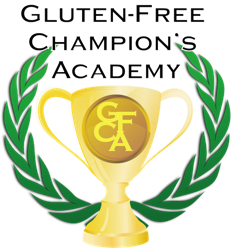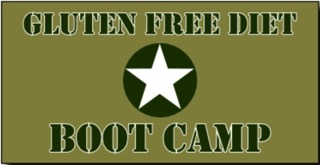Gluten-Free Champion

Your spouse, family member, or friend has suffered from recurring health issues for years. You’ve seen them at their best, and at rock bottom. Regardless of how long they’ve been suffering, you don’t like to see it.
Finally, someone figures it out; your loved one has just told you they must be gluten-free. You’re not really sure what gluten-free is or what it means, but you politely listen to their brief explanation and nod your head sympathetically.
“Wow,” you think. “That sounds horrible. Sure glad I don’t have to go through that.”
Sorry to break the news, but pack your bags – you’re going on the journey with them. Why? Because you are a caring, compassionate human being and you want them to be healthy and happy. Good for you!
If you’re a spouse, you made that commitment when you said, “I do.” If you’re a friend, you signed up when you accepted their most precious gift of trust. If you’re a family member, your name has been on the trip’s manifest since birth. They deserve your respect and help because that’s just what family members do for one another.
“…but, I know nothing about this, how can I be so important?”
The important take-away here – you have the power to help them. Your support in this effort is crucial; it could mean the difference between their success and failure.
Support doesn’t require money, or even specialized knowledge. It can be as simple as just being there for them in whatever way they need you - a smile, a hug, a sympathetic ear, or a strong shoulder. It can also be much, much more.

You may not know it, but hiding beneath your street clothes is a superhero’s suit just waiting to be called into action.
We have a few tips and wealth of information in The Gluten-Free Champion’s Academy (see below) to help you make the leap.
Peggy’s Story
What do you do when someone you love gets sick? What do you do when nothing helps them to feel better? What do you do when your best friend, your soul mate and your life partner has changed so drastically that you barely recognize him...
That was the position I found myself in about 14 years ago. It all started gradually, an upset stomach here, some foot pain there, a little more burping and belching than usual. Nothing big, until it got big. When my normally cheerful, energetic, quick to laugh husband was replaced by a pale, thin, ill man I hardly recognized. A person who sat listlessly staring into space not wanting to see friends or attend family functions for no other reason than "I just don't feel good”.
As the complaints increased there was much "encouragement" to see the doctor and get these thing "checked out". The assumption was that a test or two would pinpoint the problem and a medication would be prescribed and everything would be fine.
That’s not what happened. A test or two turned into multiple tests and multiple doctors which did not find the root of the problem. Medications were prescribed that only helped a little or not at all. No real answers were to be found. In the meantime Al continued to get sicker, I felt even more helpless.
I worked in healthcare for God's sake, someone, somewhere must have some idea, something that would make him well again. With increasing frustration and fear, I often found myself crying in the shower so he wouldn't know how afraid I was. I wondered if he were dying as I was just standing by helplessly, watching.
Fast forward to March 2003 where we find ourselves on a white sandy beach surrounded by the beautiful turquoise blue water of Jamaica. When my unwell husband requested a vacation to somewhere warm, I, his loving and dutiful wife made it happen! That March was my turning point.
Al had been doing a lot of research and discovery about this thing called gluten and it's effects on some people. While the discoveries he was sharing with me were very counter intuitive; [read what do you mean crackers and toast can give you a belly ache?] they oddly sounded like him and his symptoms. His gastro doctor was willing to take intestinal biopsies for celiac disease, however the samples did not show intestinal damage. Finding non-celiac gluten sensitivity presented with similar symptoms without intestinal damage, Al started experimenting with a “gluten-free” diet but, the first real evidence I saw happened in Jamaica.
Before the week ended I had my husband back! The energetic guy who was actually looking for a pickup volleyball game! Some may say it was the magic of Jamaica and I won't disagree, but a large part of that magic was the naturally gluten-free diet that he ate.
That week "sealed the deal" for me. Any time that Al would question himself about whether being gluten-free was really the root of the problem or not, my mind went back to that week and the health it brought.
There were plenty of times the groceries I brought home went to the local food pantry because l had made the wrong choices; gluten-free labeling laws didn’t exist then. Full loaves of bread and bowls of pasta were chucked into the garbage because they were so bad Al couldn't eat them. The first batch of beautiful gluten-free cookies came out of the oven only to disintegrate into dust when I tried to take them off the pan! We learned from those experiences and tried to make things better the next time. We didn’t give up. I think the key word is we, I think that Al has been just as much of a support to me as I have been to him. He has always encouraged my efforts and has been appreciative of them.
As the gluten-free lifestyle became our new normal, it became more important to me that it be “normal”. When I was asked by family and friends about the diet, I always responded there are more things he can have than things he can't.
It also became my goal to show people that gluten-free was not synonymous with taste-free. I have always enjoyed cooking and baking for people. Nothing gives me more pleasure than to have someone eat and enjoy what I have made and then ask me to make it again. Slowly, I continued transforming all Al's favorite gluten-full treats to gluten-free treats. It became my passion to learn new ways of baking so others wouldn’t feel left-out. And then to be able to pass on what I had learned to others just added to my joy. It has become my way of supporting and helping others on their gluten-free journey. In my humble opinion no one, gluten-free or not should ever go without a good cookie or piece of cake!
Al and I have also been blessed with supportive family and friends. Their willingness to make sure Al can eat safely in their homes has been a Godsend to us. Their efforts have not gone unnoticed or unappreciated and have made my job as main support so much easier.
I never considered myself a "champion", but according to the definition, I am and will continue to stay the course.
- Tuli Kupferberg
You’ve probably discovered this will be a life changing event. It is not simply a change in diet - it’s a change in lifestyle. The cold, hard truth - it affects every aspect of day-to-day living. Not only for your gluten-free loved one, but for you too. Because of your relationship you will experience these changes with them, albeit in a different way.
Knowing how to deal with change is important. Change is never easy. In fact, it’s one of the most difficult aspects of this. It will take time and effort, but the gluten-free lifestyle will become the new normal both inside and outside your home.
As with anything new, there will be challenges to navigate and some things will need to change to keep your loved one safe.
Embrace these changes and you will see all the good things that will come with your new normal.
Know what you are dealing with.
Knowledge is your friend. Once it has been determined that gluten is the culprit making your loved one ill, learn about it.
You don't need to know the exact science, but have a basic understanding of what happens to the body when gluten is ingested, how can it make that body feel, where gluten is found and what should be avoided.
You will need to adjust how much you know around your loved one’s knowledge. If your situation requires you to be the “guardian of the knowledge” (e.g. for your child) you’ll slowly want to pass that knowledge on to them. Teach them how to look for gluten and know its hiding places, teach them how to cook.
Communicate
As in most things, communication is key. An essential element of communication is listening. Your loved one is going through so many changes, both physical and emotional. If they are newly diagnosed there is a grieving process to navigate. Sometimes they may need someone to listen to their frustrations and fears...not offer opinions and solutions, but just to listen.

When emotions boil over, things can be said in the “heat of the moment”. Conversations can quickly turn into confrontations, further damaging the relationship. It’s important to know the difference between the two.
Conversations are fueled by curiosity.
Confrontations have an aura of a judicial proceeding.
Conversations frame a problem as something to be solved.
Confrontations have an element of moral superiority.
Conversations happen between equals.
Confrontations shield the confronter from any responsibility.
Conversations say “we’re in this together."
Conversations will preserve the relationships while the people involved work toward understanding and solutions.”
~Marie Hartwell-Walker, Ed.D.
Source: http://bit.ly/1GQw2q1
Beside working through the physical and emotional elements, there will be many practical, day-to-day things that need to be discussed. Meal and menu changes, how to handle kitchen clean up and what precautions need to be taken to avoid cross contamination or make the house totally gluten-free, how to replace those family favorite foods with a good gluten-free alternatives.
You may need to communicate with family and friends about the new diet and the importance of your loved one's need to not deviate from it. Yes, a little bit of gluten does hurt!
Being open to and answering their questions and planning strategies on how to manage family functions and parties will be a large part of the communication process.
Warning: Family members can be difficult and unsupportive.
You may also need to convey gluten-free requirements to people outside your immediate circle - servers in restaurants, the pharmacist at the drug store, and the pastor at church, and yes - even medical professionals.
Be clear, concise and confident in your communications.
~0~
Sometimes your gluten-free loved one isn’t taken seriously, so it helps to have another person [like yourself] be an ambassador - an advocate [fancy words for a “kick-ass champion”]. Someone who will travel not ahead, nor behind, but beside them on the path to gluten-freedom.
It may be trying at times, but please understand they are not being difficult on purpose. Everyone wants to be happy and healthy, for some it requires a bit more effort.

There may be days when you feel like you are not making an impact, but know you are an important team member. Not every hit is a home run, and sometimes a superhero simply helps someone cross the street. No act of kindness is too small.
Kudos to you for stepping up and becoming a Gluten-Free Champion!
Peggy & Alan Klapperich
Gluten Intolerance Group of East Central Wisconsin
P.S. Your cape should arrive within four to six weeks.
“To laugh often and love much; to win the respect of intelligent persons and the affection of children; to earn the approbation of honest citizens and endure the betrayal of false friends; to appreciate beauty; to find the best in others; to give of one’s self; to leave the world a bit better, whether by a healthy child, a garden patch or a redeemed social condition; to have played and laughed with enthusiasm and sung with exultation; to know even one life has breathed easier because you have lived—this is to have succeeded.”
report relationship burden
Healio Gastroenterology article by Will Offit
“As much as 37% of partners of patients with celiac disease reported relationship burden, according to a study presented at Digestive Disease Week 2016.
Given the multifaceted manner in which celiac disease can affect patients, it's not unreasonable to expect that the impact of celiac disease may extend to their relationship partners,” Abhik Roy, MD, gastroenterologist at New York-Presbyterian University Hospital of Columbia and Cornell, said during a presentation. “Our study shows that partner burden is quite common in celiac disease with more than one-third of partners experiencing at least mild to moderate burden.”
Our study shows that partner burden is quite common in celiac disease with more than one-third of partners experiencing at least mild to moderate burden.
The degree of burden found in this study was similar to that reported for IBS and cancer, the researchers wrote. In addition, the researchers recommended that health care providers address these relationship factors in their care of patients with celiac disease.
As patients and partners progress in their relationships, the burden of celiac disease seems to shift from the short term focus on diagnosis and dietary modifications to the prognostic implications and uncertainties of a chronic illness,” Roy said. “This illustrates the emotional burden of celiac disease and stresses the importance of including the partner in clinical education and counseling."
What is gluten?
Where is gluten found?
It’s even found in personal care, hair and beauty products.
How Much Gluten?
Not only must the food be gluten-free, it must not come in contact with any gluten.
Yes, even a small crumb can cause problems!
Studies have shown that some celiacs could consume up to 10 milligrams of gluten per day. (10mg = 1/8th of a teaspoon of flour).
How much is 10mg? An average grain of rice weighs 28 mg. 1/3 of a grain is just under 10 mg.
BUT - For many, even 10 mg is too much.
No gluten is the goal.
What is Celiac Disease?
Untreated, this condition can lead to: malnutrition since nutrients are not being absorbed properly, additional autoimmune diseases, increased risk of certain cancers.
Learn more:
http://bit.ly/1Nhdden
What is Non-Celiac Gluten Sensitivity (NCGS)?
NCGS can present with many of the same symptoms of CD, however it does not present with same autoimmune intestinal damage. The lack of intestinal damage does not make this condition any less severe than celiac disease. Damage can occur in other body parts.
Learn more:
http://bit.ly/1oMsOfA
How do we deal with the changes?
by Alan Klapperich
http://bit.ly/GIGECW-Change
I want to give you a basic understanding of change and the knowledge to make it a successful transition."
How to Withstand Food Peer Pressure
by Karen Diaz, RD
http://huff.to/1OMFmKx
“When you are trying to listen to your body, food peer pressure can be the last straw making you throw in the towel. Here are four important ways to withstand food peer pressure.”
How can I be a better listener?
by Susan Heitler, Ph. D.
http://bit.ly/1V1Hkhb
Listening enhances the health of your marriage and other close relationships.
Listening to yourself enables you to live with more well-being, especially if you combine listening to yourself with listening to others.
Listening to your body keeps you physically healthy.
And between a couple, listening is an act of love.”
Effective Listening Habits:
Problematic Listening Habits:
To learn more details on these habits, and take a self-assessment listening quiz:
http://bit.ly/1V1Hkhb
What is "holding space" and how do I do it?
How to be there for the people who need you most
by Heather Plett
http://bit.ly/1WDtm6f
It means that we are willing to walk alongside another person in whatever journey they’re on without judging them, making them feel inadequate, trying to fix them, or trying to impact the outcome. When we hold space for other people, we open our hearts, offer unconditional support, and let go of judgement and control.
Where can I find more gluten-free information?
GIG of ECW's Gluten-Free Diet Boot Camp is a large collection of information on celiac, non-celiac gluten sensitivity, gluten-free diet basics, recipes, dining, and a whole lot more!
Learn more: http://bit.ly/GIGECW_GFBootCamp
updated 09/30/18 - Added GIG of ECW’s The Stages of Change: Gluten-Free Edition article
updated 6/11/16 - Added "Partners of patients with celiac disease report relationship burden" article